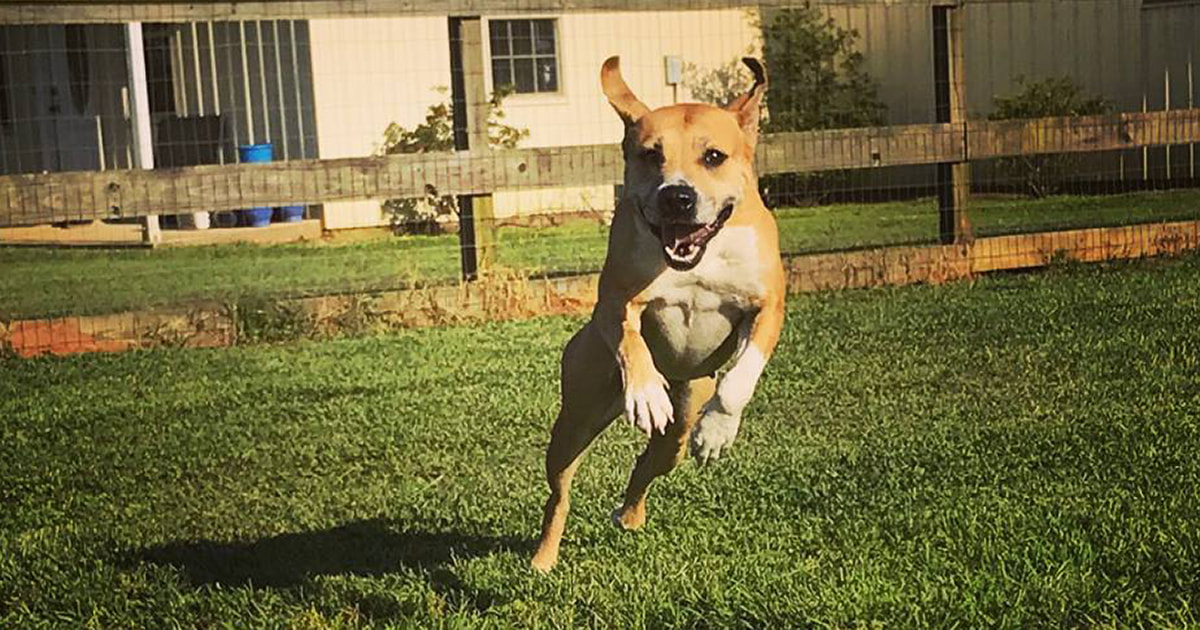A local rescue group specializing in saving "throw-away" pit bulls in South Mississippi has saved more than forty dogs in the past year. Meet Just Cause director Jeanne Montana and find out why she's smitten with a breed that gets a bad rap. - story by LB Kovac
These are fitting mantras for a group tasked with not only saving abandoned and unwanted dogs but also changing public perception to help them find loving forever homes. Jeanne Montana is the founder and owner of Just Cause, a Saucier-based rescue group that specializes in pit bull breeds. Originally a bartender by trade, she started the organization after meeting two special pups. “After Hurricane Katrina, my daughter, who had two pit bulls, had to live with me,” says Montana. “(The dogs) really changed my perception. They were great.” She became more intrigued, she said, “when the Michael Vick story came out.” Vick, former quarterback for the Atlanta Falcons, was arrested in 2007 for using pit bulls in an illegal dog fighting ring run out of his personal kennel, which he called Bad Newz Kennel. This intrigue developed into a passion. Montana’s organization now partners with animal shelters along the Mississippi Gulf Coast, including our own Hancock County animal shelter, to take “overflow animals,” dogs that the shelter doesn’t have resources to help and that would otherwise face euthanasia. Pit bulls are one of the least-adoptable dog types in any given shelter. According to a story published in The Washington Post, they are the most common dogs in animal shelters, and the dogs spend, on average, three times as long in the shelter as lookalike breeds. Of the 1.2 million dogs euthanized in American shelters each year, a vast majority (800,000 - 1 million) are pit bulls. According to Esquire Magazine, that's about two to three thousand pit bulls killed in this country every day. In addition to saving shelter dogs, Montana also takes in stray dogs or dogs surrendered by their owners. “Lots of people bring in their pits because their landlords won’t let them have them. We also get dogs abandoned for other reasons,” says Montana. With the help of Just Cause’s dedicated network of workers and volunteers – De Conover, David Snyder, Petra Lafferma, and Denise Hines, among others – Montana gets the dogs veterinarian attention and places them in a foster’s care. Though Just Cause accepts all dog and cat breeds, Montana continues to specialize in pit bulls. These breeds need special attention, says Montana: “You have to be kind of firm with them.” They also have to fight a prevailing image that they are highly aggressive dogs. But pit bull breeds aren’t necessarily more aggressive than other dog breeds. “Pit bull” is a term that covers several breeds. American Staffordshire Terriers, American Pit Bull Terriers, and American Bullys are just some of the dogs often referred to as pit bulls. These dogs all have physical characteristics in common – shorter noses, wider jaws and jowls, and compact and muscular bodies – as well as overlapping ancestries, but they’re distinct breeds. Still, all pit bull breeds get a bad rap. Forbes put the lot at the top of their 2016 “Most Dangerous Dogs” list. Cities across the country have enacted BSL, or breed-specific legislation, requiring owners to have some or all pit bull breeds leashed and muzzled all times in public. Pit bulls pick up some of their aggressive reputation from the different breed backgrounds. Many pit bull dogs were bred for bull- and bear-baiting shows in the early 1800s. The breeds continue to be popular for dog fighting rings, as evidenced by the Michael Vick story. Of the more than 8,000 dog-on-human bites collected and recorded by website Dog Breed Info between 2013 and 2016, 674, or about 8%, of the bites came from one breed of dog: the German Shepherd. The American Pit Bull Terrier, the first of the pit bull breeds to make the list, had less than one-third of the recorded bites of German Shepherds.
And a study published by The Atlantic of more than 4,000 dog owners found that diminutive chihuahuas were the “most aggressive” breed. In that same study, owners “consistently ranked (the American Pit Bull Terrier) as one of the least aggressive dogs.” Montana and her team have to fight this perception every time they put a pit bull up for adoption. “Lots of animals are scared when they come to the shelter,” says Montana. “Pit bulls might look mean, but they are just like other dogs. They’re just more misunderstood.” Luckily, more people are beginning to see past the pit bull’s brash exterior. In the year that the Just Cause has been operating, it has helped about 40 pit bulls and dogs find their forever homes. These pups are getting the helping hand, or paw, that they deserve. Comments are closed.
|
Categories
All
Archives
July 2024
|
Shoofly Magazine Partners
Our Shoofly Partners are local businesses and organizations who share our mission to enrich community life in Bay St. Louis, Waveland, Diamondhead and Pass Christian. These are limited in number to maximize visibility. Email us now to become a Shoofly Partner!




























 RSS Feed
RSS Feed























